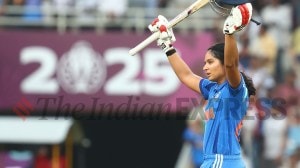For now,Indias the stage
Economists and corporates around the world will use the Commonwealth Games to assess India
The Commonwealth Games,which opened here on Sunday,are unlikely to be gripping viewing for sports fans. After all,most of the top international athletes have withdrawn,citing everything from safety to scheduling to muscle strains.
But the Games,a quadrennial competition of nations from the old British Empire,may be closely watched by economists and business executives around the world nonetheless. As India emerges as an economic player,the business world will view the games as something of a management competency test.
It is India,and India is a rising power, said Arvind Subramanian,a senior fellow at the Peterson Institute for International Economics in Washington.
India,with its nearly 9 per cent economic growth and rapidly increasing middle class,has become the latest popular destination for global companies and low-growth Western governments. That is why many of the same Western nations that were publicly upset by Indias lack of sports preparedness have recently stepped up their trade efforts with the country.
In July,Britain sent a large trade delegation that included Prime Minister David Cameron,and just last week,Canada announced it would set up a chief executive forum with India and hoped to triple bilateral trade to $15 billion by 2015. Australia is pushing hard for a free-trade agreement with India,and New Zealand has secured one.
The games are the first time that India has hosted a truly global athletic competition. In fact it is the first time in decadessince the Asian Games in the early 1980sthat India has held any major multinational sports event.
Despite photos of filthy accommodations for athletes,a collapsing footbridge,a tourist shooting and allegations of corruption,not a single one of the 54 participating countries and 71 teams has backed out of Indias Commonwealth Games. India,like other emerging economic powers including China and Brazil,has become too important on the world stage,analysts say.
Nothing will progress without the cooperation of China,India and Brazil, said John Lee,foreign policy fellow at the Center for Independent Studies in Sydney.
Emerging markets are expected to make up just over 30 per cent of the worlds gross domestic product this year,according to the International Monetary Fund figures,double their contribution in 1985. And partly because of the recession that was touched off by banks in the developed world,countries like India and China will contribute most of the global economys growth this year.
Emerging market countries are also increasingly hosting international sporting events,and,as developed nations are finding,they are doing things in their own waywhether it is the eerie precision of the Beijing Olympics,the glitz of South Africas World Cup or the chaos of India.
While developed nations seem to recognise the need to tap into Indias fast-growing economy,it still seems to be a tough transition for some to view India as a grown-up power to reckon with.
I would hope that at the end of all of this India would have learned a great lesson, the Commonwealth Games Federations president,Mike Fennell,said last week. In the past,such a remark might have been attacked as patronising,or worse,by many of Indias top leaders and thinkers.
But in todays India,where the number of billionaires grew by 50 per cent last yearto 69 people,according to the latest Forbes listno one in the government even seemed to notice. Rather than expressing remorse,Indian officials have started to make remarks seeming to ask what all the fuss was about in the first place.
Anywhere,where international events take place,work continues till the very last minute, Sheila Dikshit,Delhis chief minister,said last week.
Still,organisation of sporting events and parades can be overrated as a measure of economic prowess,said Lee of the Center for Independent Studies. North Korea has great military parades with 200,000 people,but no one looks to them to predict the future,Lee said.



- 01
- 02
- 03
- 04
- 05




























